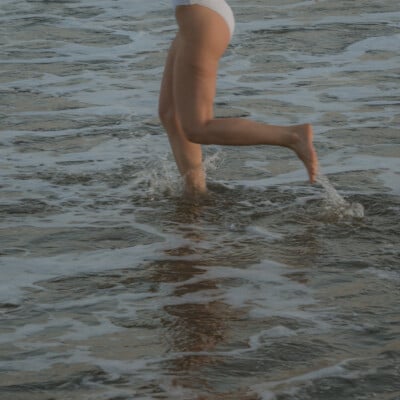I had a minor panic attack on the day I had to choose a college major. The gravity of the decision weighed heavily on me. I feared I’d spend four years studying something I didn’t like, or worse, set myself up for a career I wasn’t passionate about. What I didn’t realize then was that it really didn’t matter! A piece of paper wasn’t going to determine my future—I was. We’re never locked into a specific path, and if you’re still not sure what to do with your life, don’t stress. That’s why I reached out to Dr. Amitha Kalaichandran’s for this story—to act as a guide of sorts toward finding greater clarity on how to find your purpose and create a life with meaning.
“A life that has meaning is one that brings a profound sense of peace and joy on more days than not, attracts like-minded/like-hearted people, and a feeling of thriving and ongoing expansion.” – Dr. Amitha Kalaichandran
If you haven’t read any of her work, you’re missing out. From MindBodyGreen to The New York Times, I had seen this writer’s byline all over the web. After being struck by her work more than once, I had to learn more. One glance at her stacked resume and you’ll see this jill of all trades has taken on many roles in her career. As a journalist, wellness coach, researcher, yoga instructor, physician, public health expert, and more, Kalaichandran has a unique gift for weaving together science and storytelling to inspire others to live healthier and more purposeful lives.
Despite the Beethovens and Shakespeares of the world, we’re not all born with one distinct purpose that motivates us. In fact, our collective paths towards self-discovery and growth are usually not linear, and there is always room to switch gears and do something different. To me, Kalaichandran is living proof that you can have more than one purpose in life.
So, read on to learn more from Kalaichandran on how to find your purpose. It turns out that the answer is more simple than you’d think, but it starts by searching outside of yourself.

photo by Riley Blanks
Pay attention to your surroundings.
Like so many others, Kalaichandran discovered her passion for health and wellness through hardship. “My experience in residency exposed me to a side of healthcare that I didn’t previously know existed: that which involves how doctors are trained, and specifically the hospital environments that lead to poor well-being and burnout,” she says. “This is often secondary to leaders who do not know how to lead effectively, harassment and abuse, administrative burdens, and the pressures of caring for complex patients with limited resources (namely time).”
Kalaichandran realized there were gaps in the system that held both physicians and patients back. “This was a lightbulb moment for me in many respects, as it trickles down to patient care (such as medical errors which may be covered up), staff burnout, turnover, and transfer, and can also lead to tragedies such as physician/trainee suicide. And while there is a LOT of discussion on “wellness” initiatives, and I’m personally trained in many of these aspects (for instance, mindfulness), these end up being unsustainable band-aid solutions when we don’t confront the root cause, as we would for patients with complex illnesses.
“So, for me, it was about seeing a general theme play out in my own environment, and the agency I had to make a difference locally and on a larger scale.”
After noticing the pattern that was repeating itself over and over, Kalaichandran knew things had to change. “Ultimately as physicians, we are tasked with making patients ‘better,’ but often this requires stepping back and looking at the systems at play that makes them ill,” she adds. “And seeing that usually, a version of these systems, in turn, makes physicians unwell, and thus unable to play the healing role they are trained for and which patients deserve.”
Find out what fuels you.
“I tend to think of ‘purpose’ as being born out of a confluence of opportunity, luck, careful thought and reflection, experience, and intrinsic motivating factors.
Kalaichandran doesn’t believe people are born with one specific purpose. “The Japanese idea of ‘Ikigai,’ is a great model of purpose, as it describes the intersection of a variety of factors, including that which the world needs and what our talents facilitate.” Basically, your Ikigai is the reason you get up in the morning, and your biggest motivator in work and in life.
She explains how our lives begin to shape what drives us toward our purpose, and sometimes our biggest motivators are born out of struggle. “For instance, we’ve heard of many trailblazers who have taken a tragedy and turned it into their ‘purpose’ – the whole #MeToo movement is predicated on that,” she outlines.” There is an advocacy component: an idea that many victims are fueled to change broader systems. And Viktor Frankl is perhaps one of the most famous examples. He used his awful experience in a concentration camp during the Holocaust as a catalyst to dive deeper into what it means to create a meaningful life, and the power of our minds: he imagined a different ending to his story and actualized it.”
Overall, finding your true calling is more than just soul searching. You have to be an active participant in the world around you, which sometimes involves going out of your comfort zone. Kalaichandran adds, “much like purpose, [our passions are] based on what experiences and opportunities we are exposed to, the people we meet, and our ability to lean into discomfort. For instance, someone might be passionate about something even if they might not have innate talent: but they may just be motivated enough to work at it which both derives from their passion and is fueled by it.”

Eliminate Distractions.
Sometimes we have to drown out the excess noise in our lives to get in touch with what really matters to us. Kalaichandran explains how “taking time away from distractions (this includes work but also people who don’t inspire you or motivate you) is crucial. Some find journaling helps, or sketching out roadmaps or making vision boards – these can be helpful to help sort through the layers of what we really want in general (not just finding our purpose) and visualize something concretely.”
We can also start by questioning some of the things we normally wouldn’t.
“Questions are probably a better approach: taking each experience and beginning with ‘what might this be teaching me? What is the opportunity here that isn’t all that obvious?'”
Establish a sense of direction.
If you’re still feeling lost, Kalaichandran explains how re-framing your mindset and staying positive can open up new possibilities. “We might want to reimagine what ‘feeling lost’ or ‘lacking direction’ really means because they are both just elements of freedom, and not being constrained by a given narrative, system, or set of external expectations. As such, these moments can be really incredible starting points for a better, healthier, life direction.”
Plus, it’s important to not overthink things. For example, simply “being a mom” or “making positive contributions to my community” are great aspirations to work toward.

Be flexible.
Maria Popova said it best: “allow yourself the uncomfortable luxury of changing your mind.”
Our culture has a tendency towards a fixed mindset all about “sticking to your guns”, but true conviction can be born from giving ourselves permission to go in a different direction. Kalaichandran explains how “a sense of purpose can seem lofty, and is ephemeral: it can change and should change.”
Plus, humans have become increasingly risk-averse, and I know first-hand that switching gears in life can come with a lot of fear and anxiety. That being said, many successful people attribute these pivots or ‘second lives” to finding what they describe as their true calling. Kalaichandran reminds us that it’s important to take notes and gain inspiration by turning to others.
“Evaluate your options, sketch a roadmap based on what ‘feels’ right and what others that have come before you might have followed (knowing your path will be unique),” she tells me. “And, again, I want to underscore that it’s crucial to cultivate healthy social connections that are supportive and enriching. Frankl, again, speaks about this. This meaning [our purpose] is a bit like an anchor that keeps us steady regardless of the tides (which inevitably shift for all of us, at various points in time).”
Create space for curiosity and connection.
“Curiosity is the foundation of asking important questions around purpose and meaning,” declares Kalaichandran. In order to create space for these things in our lives, she recommends we “cultivate time, as well as healthy social connections where possible (and drawing boundaries around those who are unhealthy—this could mean those who are draining to the spirit, envious, etc).” Learning how to say yes to things that truly ignite your soul and having the courage to turn down things that don’t will be key in honing in on what makes you thrive,” she says.

Find abundance in the process.
“This might sound cliché, but the biggest misconception [about fulfillment] to me is that it’s a destination.”
Kalaichandran says we have to find joy in the process and our purpose should help ground us to what’s really important. “Something might feel fulfilling one day, and not another day (think back to being a child when getting a specific toy was the greatest possible thing, and how it wouldn’t fulfill you now!).” While milestones and achievements are important to celebrate, they’re ultimately fleeting. Our purpose should be grounded in something deeper, like “living authentically every day” or “inspiring others to be more creative.”
Shifting to a mindset of gratitude not only makes you a happier person, it also helps open doors to new possibilities. Kalaichandran says this involves “being present with what you have, what you are doing (even if you’re planning to transition out of that particular ‘doing’), being grateful for the abundance that exists in the world and in our lives (even if it doesn’t always feel abundant) and being thoughtful about ways to create meaning and make a difference with the skills and opportunities you are given and that which you earn.”
The best books on finding your purpose, according to Dr. Amitha Kalaichandran:
She also recommends reading these in succession (different approaches to a similar theme):
1. Rising Strong – Brené Brown
2. Broken Open – Elizabeth Lesser
3. Braving the Wilderness – Brené Brown(the first two are on resilience and the last focuses on carving a new path)
4. Outliers and David and Goliath – both by Malcolm Gladwell (these are about success in general, and success against the odds)
To find more of Kalaichandran’s work, check out her website and twitter. Currently, she’s working on her first book, On Healing coming in 2022 and I can’t wait to read it.





